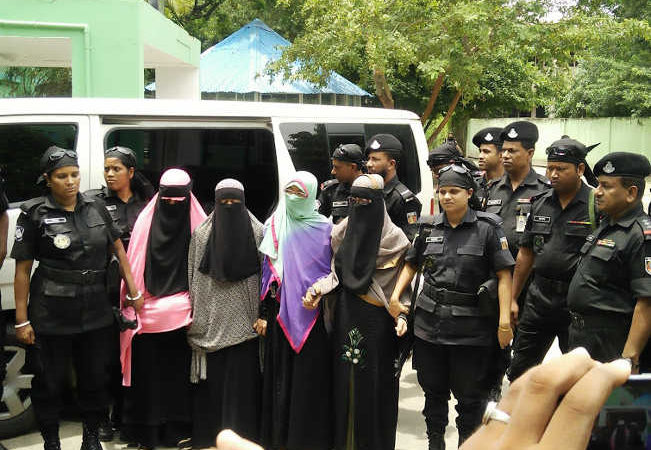From an early stage, terrorist groups have been directing their members to involve their wives and daughters in the organisations. They have also encouraged intermarriage to tighten the bonds among members and prevent desertion
Law enforcement has recently uncovered that newly activated terror groups are recruiting scores of women, especially university students, to expand their reach.
These radicalised women pose a new kind of threat that security experts say Bangladeshi law enforcement are not prepared to handle.
In his confessional statement, Jama’atul Mujahideen Bangladesh (JMB) chief Shaykh Abdur Rahman said they had some 50-60 female militants who were mostly wives of male members of the group.
Their duties were to continue Dawati (indoctrination) activities and inspire family members to be ready for jihad, he had said.
However, law enforcers have been able to arrest very few female militants. In all its operations against JMB, Rapid Action Battalion (RAB) has arrested 45 women members and 634 men of the group. Police could not provide any information on its arrests.
On May 8, Bogra police arrested Masuma Akter, wife of JMB’s Chittagong wing commander Raisul Islam Khan alias Fardeen, who was killed earlier while making bombs. Two other women were also caught with her.
On July 24, Detective Branch of Sirajganj police arrested four female JMB members, one of whom was found to be the relative of JMB leader Tarikul Islam Jewel, who was killed alongside Fardeen.
But law enforcement’s attention has only recently been drawn to the risks these female militants pose. The arrest of several female militants, specially the one in Dhaka by RAB on August 16 brought this issue into focus.
Tangail’s Kalihati police on July 6 arrested three female JMB members, aged between 19 to 30, who were later claimed they were members of a suicide squad. They were living with their husbands and children. Their husbands fled the scene and one was later killed in an encounter.
RAB arrested four suspected members of JMB female wing from different areas of Dhaka. These four are highly educated and from wealthy backgrounds, similar to some of the terrorists involved in the Gulshan and Sholakia attacks. One of them is an internee from Dhaka Medical College and other three are graduate pharmacy students of Manarat University.
From them, RAB learned that at least 20 more women were involved in the group, though only 10 names could be extracted. RAB 4 senior ASP Shamsul Haq yesterday said the names were code names and RAB was still trying to identify them.
One RAB official said the documents they found from the four women indicate that they were formerly members of Islami Chhatri Sangstha, the female students wing of Jamaat-e-Islami. But they had become further radicalised, said the source.
RAB sources said they had received information that the terrorist group was using girls and women to carry small arms.
Kalihati police station’s Inspector (investigation) Nazrul Islam said they had found names of some other female members of the group by interrogating the arrestees.
Dhaka Metropolitan Police’s Counter Terrorism and Transnational Crimes unit officials told Dhaka Tribune that they were also investigating the matter.
The officials said it was a challenge for law enforcement to deal with female militants. Police working on the field do not subject women to a lot of scrutiny, they said. Female police officers are also few in number and it is impossible to place them everywhere.
Syed Mahfujul Haque Marjan, an assistant professor of Criminology at Dhaka University, said the information published in the media in recent times indicated that RAB had found female militants who were in an early stage of training.
“But it could be more dangerous if they were fully trained and perhaps formed suicide squads. These are intelligent women, they could think innovatively and their socio-economic status could hinder security objectives,” he added.
Security expert Brig Gen (retd) Shakhawat Hossain said educated girls getting involved in terrorism was certainly a new dimension.
“I think these girls are getting radicalised for the same reasons as the boys. But this will be a difficult problem for law enforcement because women often escape suspicion,” he said.
“It is easier for women to disguise themselves, they can easily carry small arms without detection and it is easy for them to radicalise others,” he said.
Source: Dhaka Tribune










